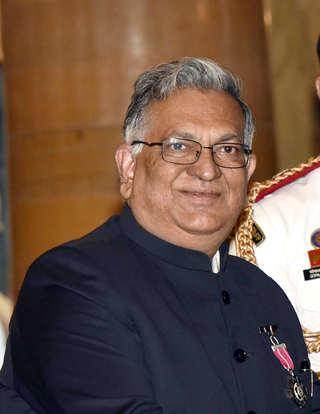
The Indian Institute of Science (IISc) is a public, deemed, research university for higher education and research in science, engineering, design, and management. It is located in the southern Indian city of Bangalore, Karnataka. The institute was established in 1909 with active support from Jamsetji Tata and thus is also locally known as the "Tata Institute". It is ranked among the most prestigious academic institutions in India and has the highest citation-per-faculty among all the universities in the world. It was granted a deemed university status in 1958 and recognized as an Institute of Eminence in 2018.

Indian Institute of Technology Kharagpur is a public institute of technology research university established by the Government of India in Kharagpur, West Bengal, India. Established in 1951, the institute is the first of the IITs to be established and is recognised as an Institute of National Importance. In 2019 it was awarded the status of Institute of Eminence by the Government of India. IIT Kharagpur is ranked among the most prestigious academic institutions in India.

The University of Madras is a public state university in Chennai, Tamil Nadu, India. Established in 1857, it is one of the oldest and among the most prominent universities in India, incorporated by an act of the Legislative Council of India under the British government.

Tata Institute of Fundamental Research (TIFR) is an Indian Research Institute under the Department of Atomic Energy of the Government of India. It is a public deemed university located at Navy Nagar, Colaba in Mumbai. It also has campus in Bangalore, International Centre for Theoretical Sciences (ICTS), and an affiliated campus in Serilingampally near Hyderabad. TIFR conducts research primarily in the natural sciences, the biological sciences and theoretical computer science.

Chintamani Nagesa Ramachandra Rao,, is an Indian chemist who has worked mainly in solid-state and structural chemistry. He has honorary doctorates from 84 universities from around the world and has authored around 1,800 research publications and 56 books. He is described as a scientist who had won all possible awards in his field except the Nobel Prize.

Madras Medical College (MMC) is a public medical college located in Chennai, Tamil Nadu, India. Established in 1835, it is one of the oldest medical colleges in India, as well as in Asia.

The National Institute of Mental Health and Neuro-Sciences is a medical institution in Bangalore, India. NIMHANS is the apex centre for mental health and neuroscience education in the country. It is an Institute of National Importance operating autonomously under the Ministry of Health and Family Welfare. NIMHANS is ranked 4th best medical institute in India, in the current National Institutional Ranking Framework.

Harcourt Butler Technical University (HBTU) formerly known as Harcourt Butler Technological Institute (HBTI) is a premier state Technical University in Kanpur, Uttar Pradesh, India. The HBTU was named after Sir Spencer Harcourt Butler, Governor of the United Provinces in British India. Its programs have been conferred in autonomous status under the university. It is one of the oldest engineering institute in the country and holds NAAC A+ accreditation and ISO 9001:2000 certification. It offers Bachelors, Masters, and Doctoral programs in engineering, natural sciences and humanities as well as Masters programs in Computer Application (MCA) and Business Administration (MBA).
Vasudev Kalkunte Aatre is an Indian scientist and former head of the Defence Research and Development Organisation (DRDO), India's premier Defence research and development organization. In that capacity, he also served as the Scientific Advisor to the Defence Minister. He is a recipient of the Padma Vibhushan award.
The Ministry of Ayush, a ministry of the Government of India, is responsible for developing education, research and propagation of traditional medicine systems in India. Ayush is a name devised from the names of the alternative healthcare systems covered by the ministry: Ayurveda, Yoga & Naturopathy, Unani, Siddha, Sowa Rigpa, and Homeopathy.

India-based Neutrino Observatory (INO) is a particle physics research project under construction to primarily study atmospheric neutrinos in a 1,200 meters (3,900 ft) deep cave under INO Peak near Theni, Tamil Nadu, India. This project is notable in that it is anticipated to provide a precise measurement of neutrino mixing parameters. The project is a multi-institute collaboration and one of the biggest experimental particle physics projects undertaken in India.
The Indian Institute of Technology (IITs) are Centrally Funded Technical Institutes located across India. They are under the ownership of the Ministry of Education of the Government of India and are governed by the Institutes of Technology Act, 1961. The Act declares them as Institutes of National Importance and lays down their powers, duties, and framework for governance as the country's premier institutions in the field of technology. The act currently lists twenty-three IITs. Each IIT has autonomy and is linked to others through a common council called the IIT Council, which oversees their administration. The Minister of Education of India is the ex officio chairperson of the IIT Council.

Koppillil Radhakrishnan is an Indian space scientist who headed the Indian Space Research Organisation (ISRO) between November 2009 and December 2014 as Chairman of Space Commission, Secretary of the Department of Space and Chairman of ISRO. Prior to this, he was the Director of Vikram Sarabhai Space Centre (2007-2009) and Director of National Remote Sensing Agency (2005-2008) of the Department of Space. He had a brief stint of five years (2000-2005) in the Ministry of Earth Sciences as Director of Indian National Centre for Ocean Information Services (INCOIS).
National Institute of Siddha is an institute for study and research of Siddha medicine. It was established in 2005 at Tambaram, Chennai, India. It is one of the eight national institutes established across nation, for training and research in "Indian Systems of Medicine and Homeopathy education", by Department of AYUSH, Government of India,
Paneenazhikath Narayana Vasudeva Kurup was an Indian Ayurvedic practitioner, researcher, writer and the founder director of the Central Council for Research in Homoeopathy (CCRIMH). He is a former vice chancellor of the Gujarat Ayurved University, Jamnagar and a former advisor of the Indian Systems of Medicine and Homoeopathy (ISM&H) of the Ministry of Health and Family Welfare. He has published several articles and a book, A Handbook on Indian Medicinal Plants, on the traditional Indian medicine system, The Government of India awarded him the fourth highest civilian honour of the Padma Shri, in 2005, for his contributions to Indian medicine.

The National Institute of Technology Tiruchirappalli is a national research deemed university near the city of Tiruchirappalli in Tamil Nadu, India. It was founded as Regional Engineering College Tiruchirappalli in 1964 by the governments of India and Tamil Nadu under the affiliation of the University of Madras. The college was granted deemed university status in 2003 with the approval of the University Grants Commission (UGC), the All India Council for Technical Education (AICTE), and the Government of India and renamed the National Institute of Technology Tiruchirappalli.

Sudhir Kumar Jain, referred to as Sudhir K. Jain is the incumbent and 28th Vice-Chancellor of Banaras Hindu University. He is a civil engineer by education and has formerly served three terms as the founding director of the Indian Institute of Technology Gandhinagar. He has carried out intensive research and development in the fields of seismic design codes, dynamic of buildings, and post-earthquake studies. Beside these, Jain has actively participated in teaching, research activities and development in earthquake engineering focused on developing countries. He is an elected fellow of Indian National Academy of Engineering. He was also elected a member of U.S. National Academy of Engineering (2021) for leadership in earthquake engineering in developing countries.

Dr.Krishnarajanagar Nagappa Ganesh is an Indian Bio-Organic chemist and served as the (founding) director of Indian Institute of Science Education and Research, Tirupati since 2017 till April 2023. He is also the founding Director of Indian Institute of Science Education and Research, Pune, that was established in 2006 and served the office till 2017. He is a recipient of the Shanti Swarup Bhatnagar Prize in chemical sciences (1998) for "his outstanding contribution towards the understanding of the chemical principles of DNA molecular recognition and for his work on various facets of DNA structure and its interaction with drugs and proteins". He is also a Fellow of the Indian National Science Academy since 2000.













